Overview of Project Management Software
In today’s fast-paced and increasingly remote work environment, project management software has become indispensable for teams of all sizes. These tools help streamline processes, enhance collaboration, and ensure that projects are completed on time and within budget.
Project management software offers various features, including task management, time tracking, resource allocation, and communication tools. These features enable teams to plan, execute, and monitor projects more efficiently.
You can read through to the end to read through various project management options. You can also use the table of contents to get directly to any part of the review that will interest you.
Importance of Choosing the Right Software
Choosing the right project management software is crucial for several reasons. Firstly, it can enhance team collaboration by providing a centralized platform where team members can communicate and share updates in real-time.
The right software can improve efficiency by automating repetitive tasks and providing tools for better resource management. Lastly, the right software can offer valuable insights through data analytics, helping managers make informed decisions and adjust strategies as needed.
Investing time in selecting the right software can lead to increased productivity, better project outcomes, and higher team satisfaction. In this post, I will explore the top 10 project management software for 2024, providing a detailed analysis of their features, pros and cons, and pricing to help you make an informed decision.
What is Project Management Software?
Project Management Software is software used by a wide range of industries for project planning, resource allocation and scheduling. It enables project managers as well as entire teams to control their budget, quality management and all documentation exchanged throughout a project. This software also serves as a platform for facilitating collaboration among project stakeholders.
Why use Project Management Software?
Project management software is a great tool for streamlining the project planning and scheduling process. When used effectively, PM software can improve team collaboration, create more effective task delegation, balance resource management and even help with budget management.
What makes a good Project Management Software?
From tracking down deliverables to managing resources and from budget management to collaboration with team members, there is a lot to be considered when running and managing projects. This holds true when choosing the right project management software tool as well. Here’s a list of the top 5 key functionality aspects of project management software to guide you in your decision.
- Task lists – being able to assign and update the status of tasks so that everyone in your team is on the same page is critical
- Schedules – many tools offer calendars, Gantt charts or milestone tools that help you understand where a task fits into the project as a whole and how much time there is to complete it.
- File sharing – being able to share and organise key project documents eliminates time wasted searching for files
- Communication – this is critical in project management as a smooth flow of communication means quick and easy problem solving
- Reporting – this is important for all team members when it comes to updating themselves on the project as a whole. However this is also a huge plus for project managers who want to ensure that the project is progressing and tasks are being carried out in a timely manner
With these aspects in mind, let’s take a look at the top 20 best project management software..
Criteria for Selecting Project Management Software
- Usability: he tool should have an intuitive interface that is easy to navigate, reducing the learning curve for new users. A user-friendly design ensures that team members can quickly adopt the software and integrate it into their daily workflows without significant disruptions.
- Features: The features offered by project management software can vary widely. Essential features to consider include task management, time tracking, file sharing, and collaboration tools. Advanced features such as Gantt charts, Kanban boards, and project templates can also be beneficial, depending on your team’s specific needs.
- Integration: Integration capabilities are another important criterion. The software should seamlessly integrate with other tools and applications that your team uses, such as email, calendar apps, and other productivity tools.
- Pricing: Project management tools can range from free versions with basic features to premium versions with advanced capabilities. It’s important to assess your budget and determine which features are essential for your team.
- Support: Effective customer support is crucial for resolving any issues that may arise while using the software. Look for providers that offer multiple support channels, such as email, chat, and phone support.
Best Project Management Software List
1. MeisterTask
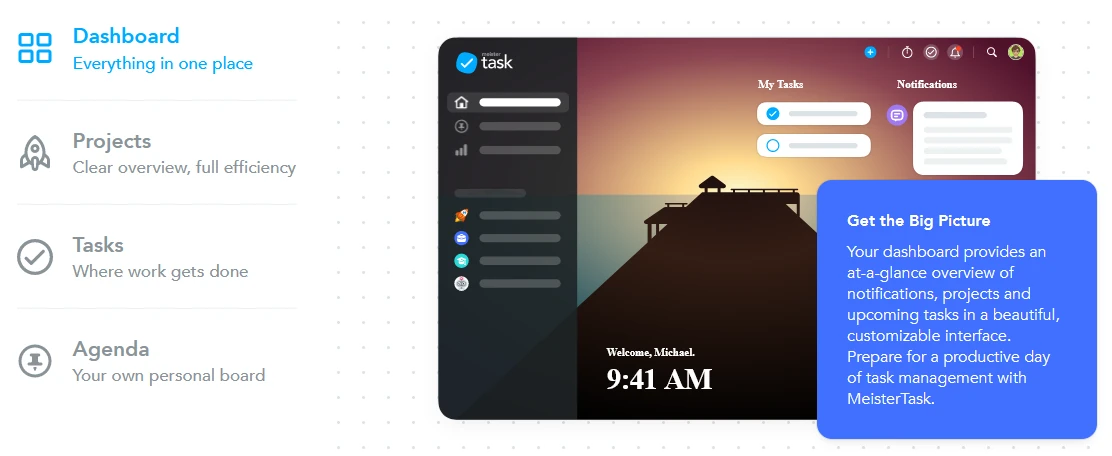
Key Features
MeisterTask is a user-friendly project management tool known for its simplicity and visual kanban-style interface. It offers features like task management, time tracking, customizable workflows, and collaboration tools. MeisterTask integrates well with other apps such as Slack, Google Drive, and Dropbox. It also offers automation capabilities to streamline repetitive tasks and improve efficiency.
Pros and Cons
Pros:
- Simple and intuitive interface
- Visual kanban-style boards
- Strong collaboration tools
- Effective integration with popular apps
- Good value for small to medium-sized teams
Cons:
- Limited advanced features compared to other tools
- May not be suitable for very complex projects
- Customization options can be limited
- Pricing: MeisterTask offers a free Basic version with selected core functionality. Other plan info is shown below.
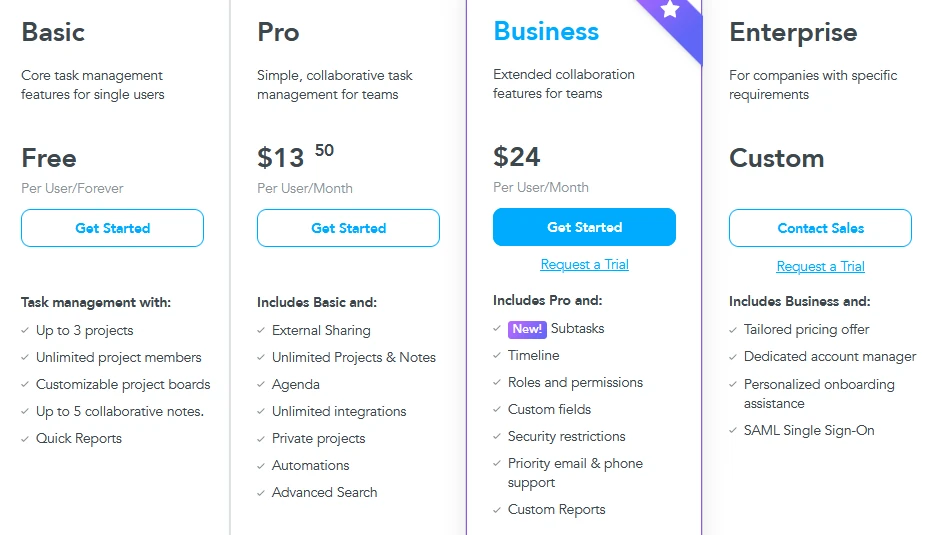
Website: www.meistertask.com
2. BaseCamp
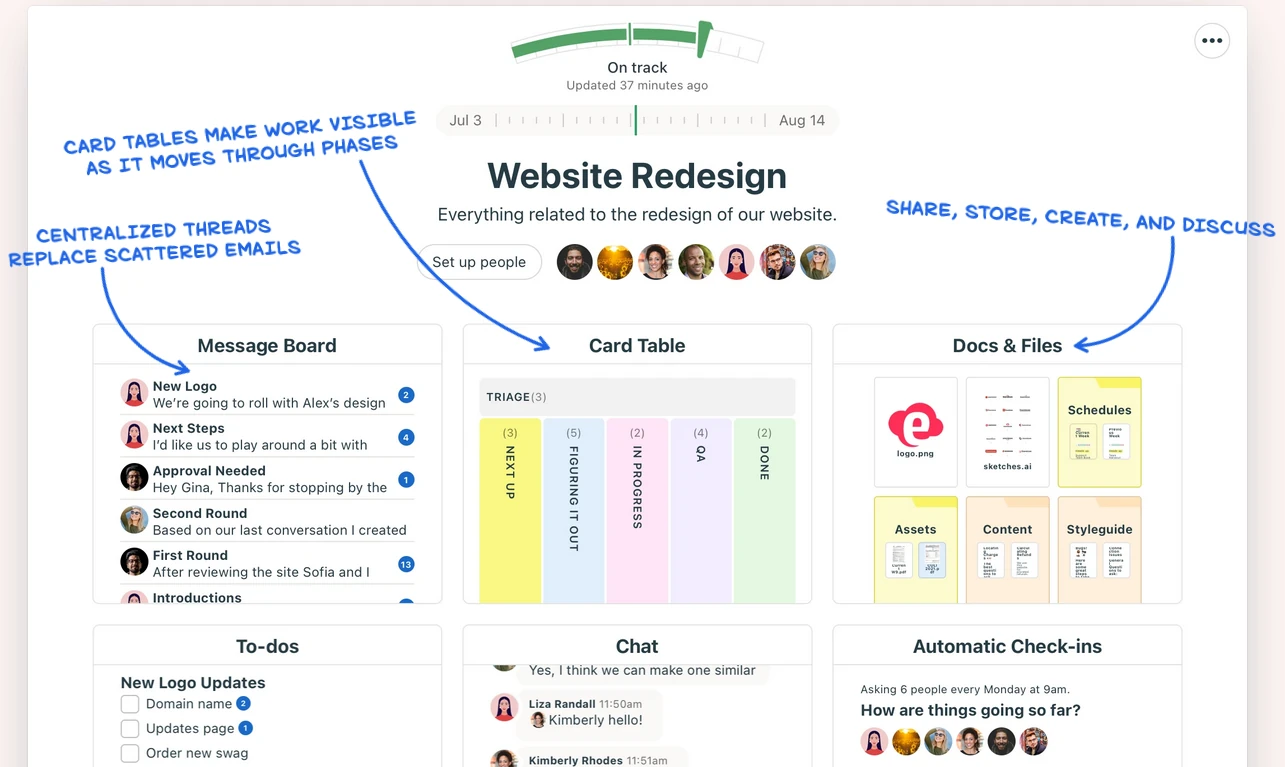
Basecamp is a popular project management software that is widely used by many project management teams. This software offers several different collaboration features such as a designated discussion area where users can leave behind comments. Additionally a recap of the projects your team is working (e.g. statuses and updates) is sent out on a daily basis to your email. Users can contribute to discussions via email as well. If you are unable to find a particular item, you can make use of this software’s powerful search tool to locate files or conversations. Some shortcomings, however, include the lack of milestones and customisation options as well as the inability to add an estimated duration for a task or assign it to more than one user.
Pricing: Basecamp is available to businesses for $99/month. For teachers and students it is entirely free of charge.
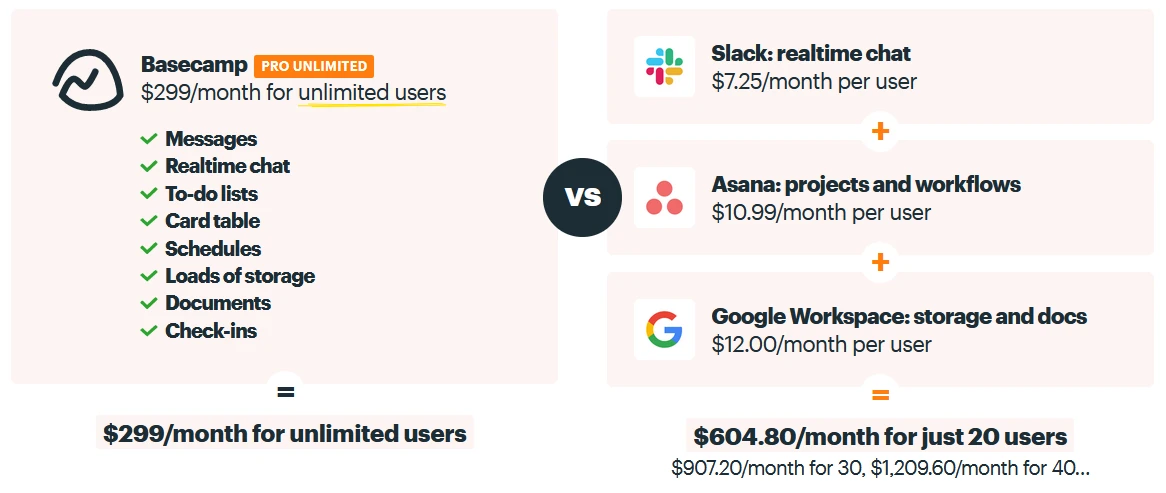
Website: www.basecamp.com
3. Asana
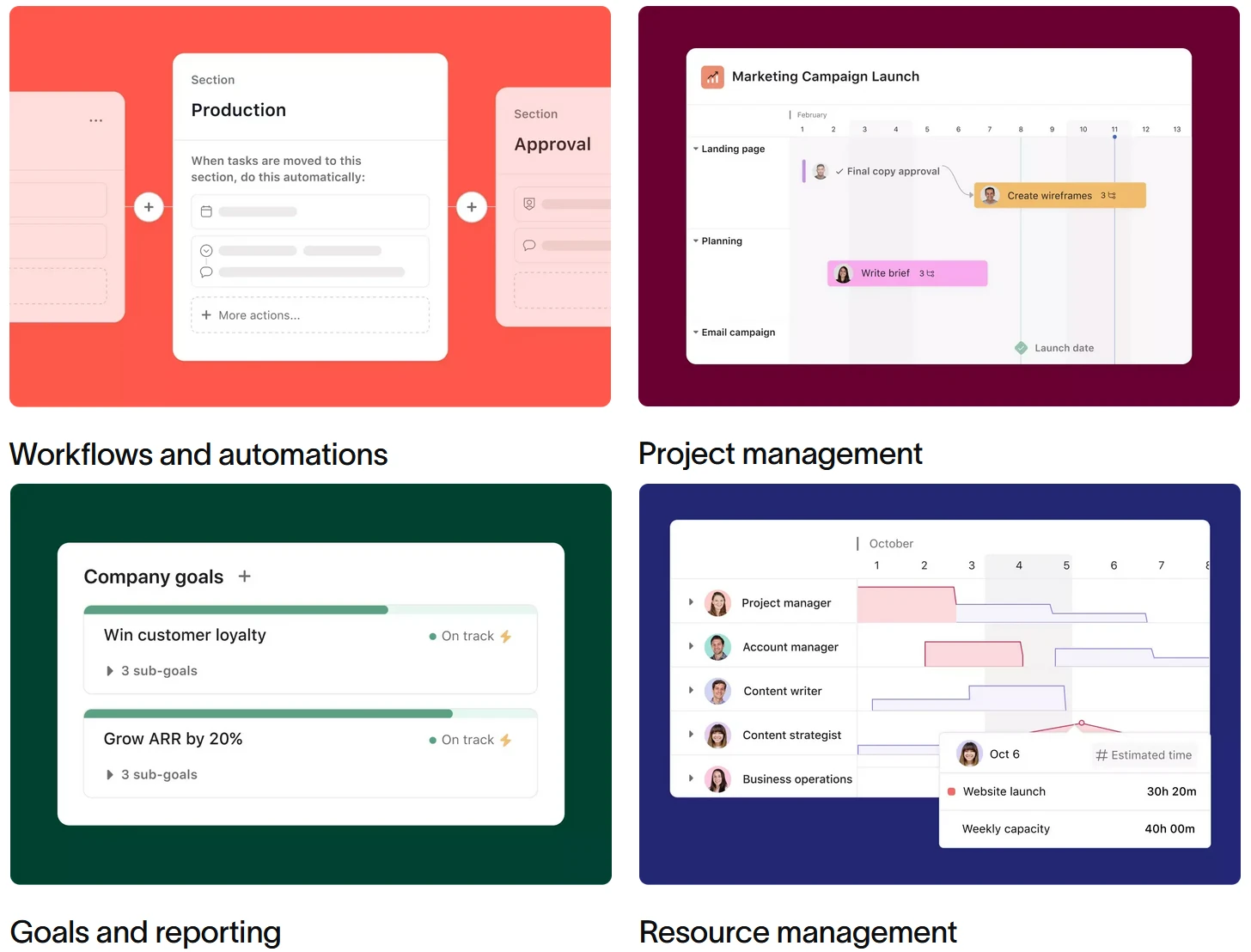
Key Features
Asana is a versatile project management tool known for its user-friendly interface and robust features. It offers a variety of task management options, including to-do lists, kanban boards, and Gantt charts. Key features include task assignments, due dates, subtasks, dependencies, and milestones. Asana also provides powerful reporting tools, automation features, and integration with over 100 other apps like Slack, Google Drive, and Microsoft Teams.
Pros and Cons
Pros:
- Intuitive and easy-to-use interface
- Highly customizable workflows
- Extensive integration capabilities
- Strong task and project tracking features
- Excellent collaboration tools
Cons:
- Can be overwhelming for new users due to the number of features
- Higher-tier plans can be expensive for small teams
- Limited offline access
Pricing
Asana offers several pricing plans to accommodate different needs:
- Basic: Free for individuals or small teams with essential features.
- Premium: $10.99 per user per month, including timeline view, advanced search, and reporting.
- Business: $24.99 per user per month, with advanced integrations, custom rules, and more.
- Enterprise: Custom pricing for larger organizations with advanced security and support.
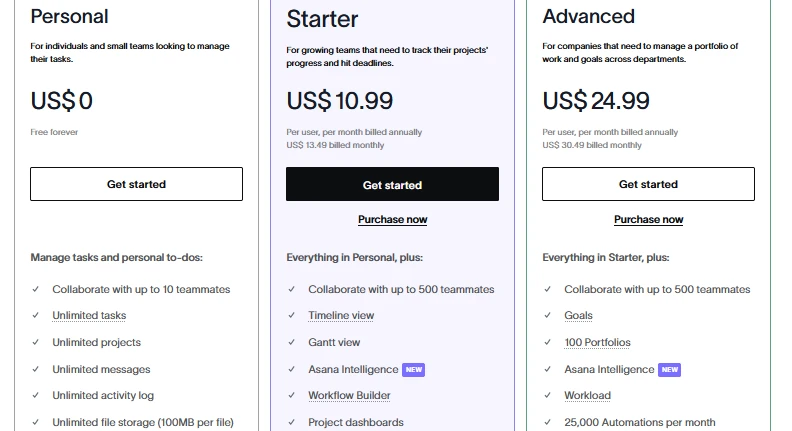
Website: asana.com
4. Trello
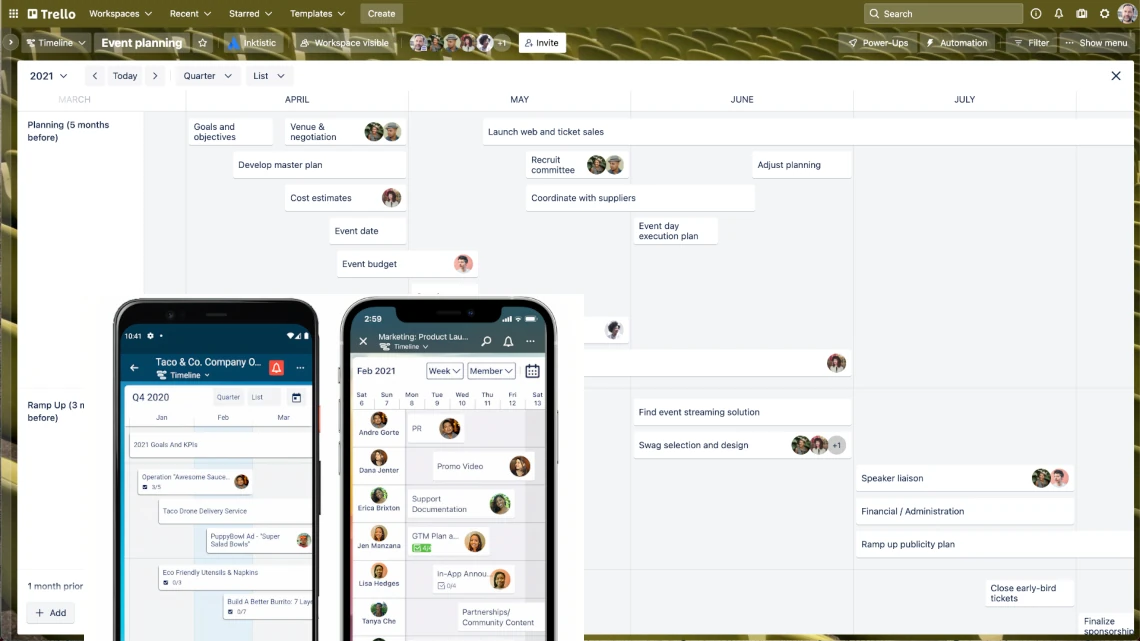
Key Features
Trello is renowned for its simplicity and visual approach to project management, primarily using a kanban board system. Users can create boards, lists, and cards to organize tasks and projects. Trello also supports attachments, checklists, due dates, and labels for better task management. Power-Ups (integrations) enhance Trello’s functionality, allowing integration with apps like Slack, Google Drive, and Jira.
Pros and Cons
Pros:
- Simple and intuitive interface
- Highly visual and easy to understand
- Flexible and adaptable to various workflows
- Free version offers substantial features
- Power-Ups extend functionality
Cons:
- Limited features for complex project management
- Higher-tier plans required for advanced features
- Can become cluttered with large projects
Pricing
Trello’s pricing plans are as follows:
- Free: Includes basic features suitable for small projects and teams.
- Standard: $5 per user per month, with advanced checklists, custom fields, and more.
- Premium: $10 per user per month, offering multiple views (calendar, timeline, etc.), and more advanced features.
- Enterprise: Custom pricing with enhanced security and administration features for larger organizations.
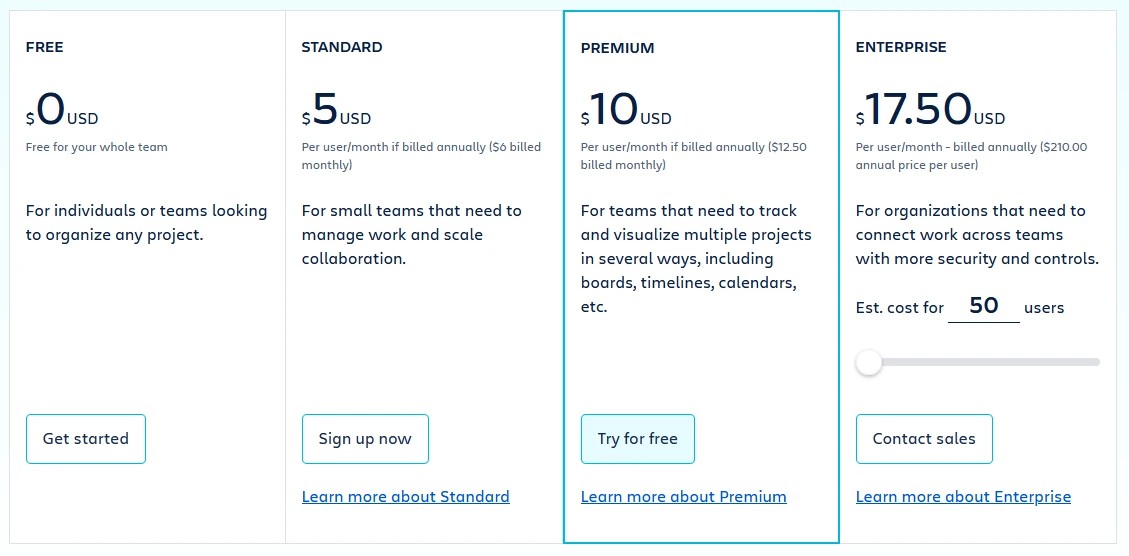
Website: trello.com
5. Jira
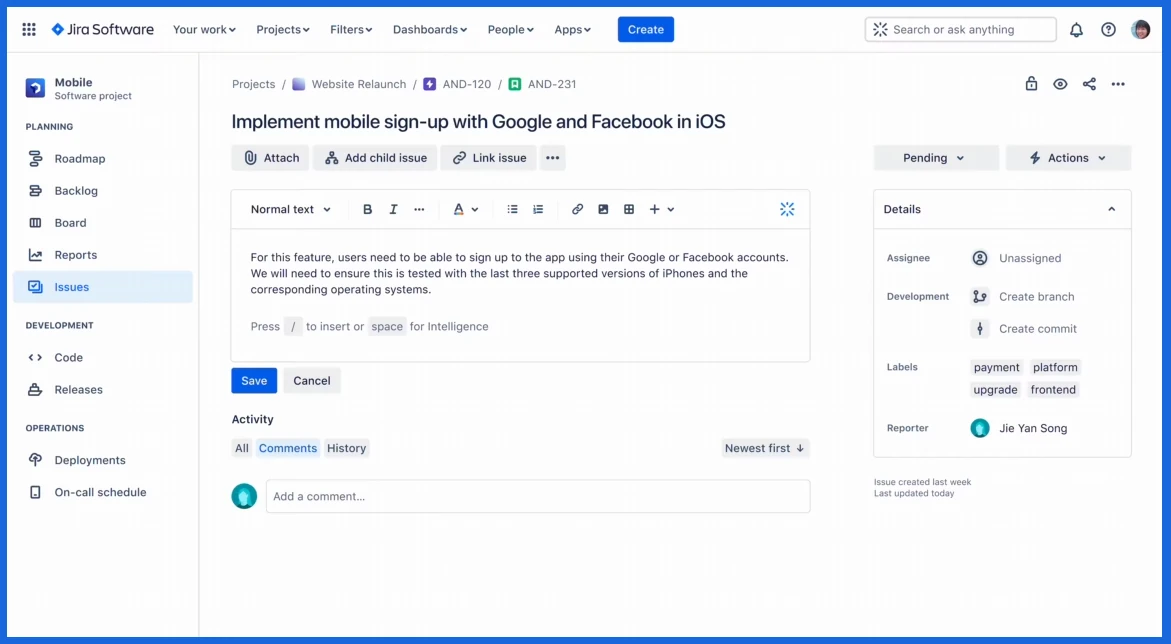
Key Features
Jira, developed by Atlassian, is a powerful project management tool favored by software development teams for its extensive features and customization options. It offers agile project management capabilities, including scrum boards, kanban boards, and robust reporting tools. Jira’s key features include backlog management, sprint planning, issue tracking, and advanced roadmaps. It integrates seamlessly with other Atlassian products like Confluence and Bitbucket.
Pros and Cons
Pros:
- Comprehensive and highly customizable
- Excellent for agile project management
- Strong reporting and analytics capabilities
- Extensive integration options
- Scalable for large teams and complex projects
Cons:
- Steeper learning curve for new users
- Interface can be complex and overwhelming
- Higher cost for advanced features
Pricing
Jira’s pricing plans include:
- Free: For up to 10 users with basic features.
- Standard: $7.16 per user per month, including advanced permissions, audit logs, and more.
- Premium: $12.48 per user per month, offering advanced roadmaps, unlimited storage, and more.
- Enterprise: Custom pricing for large organizations with advanced security, scalability, and support.
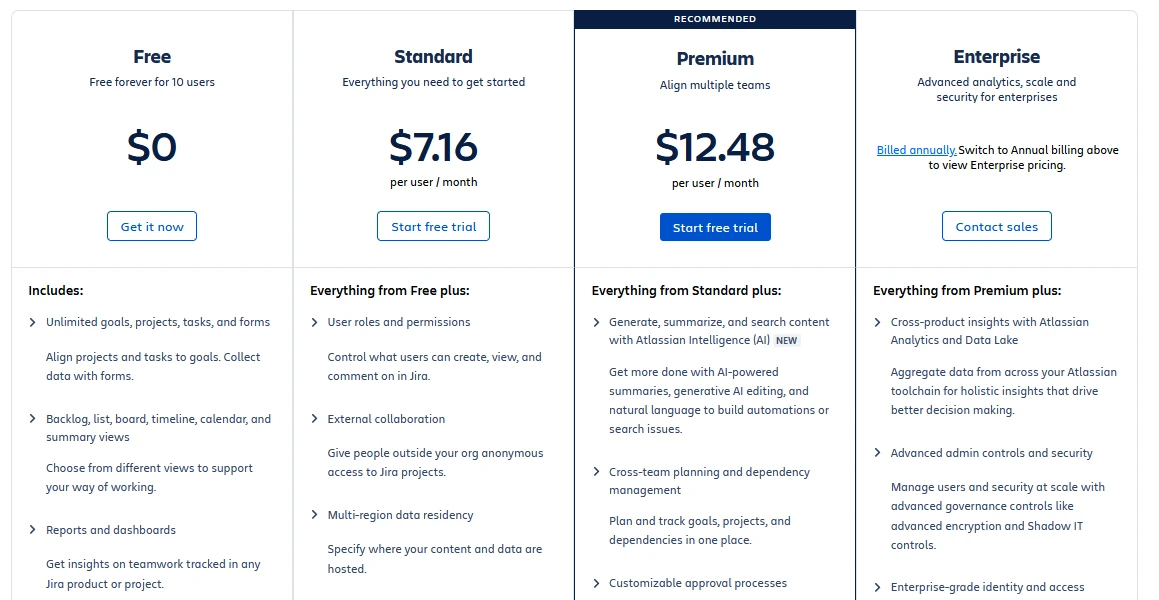
Website: jira.com
6. Microsoft Project
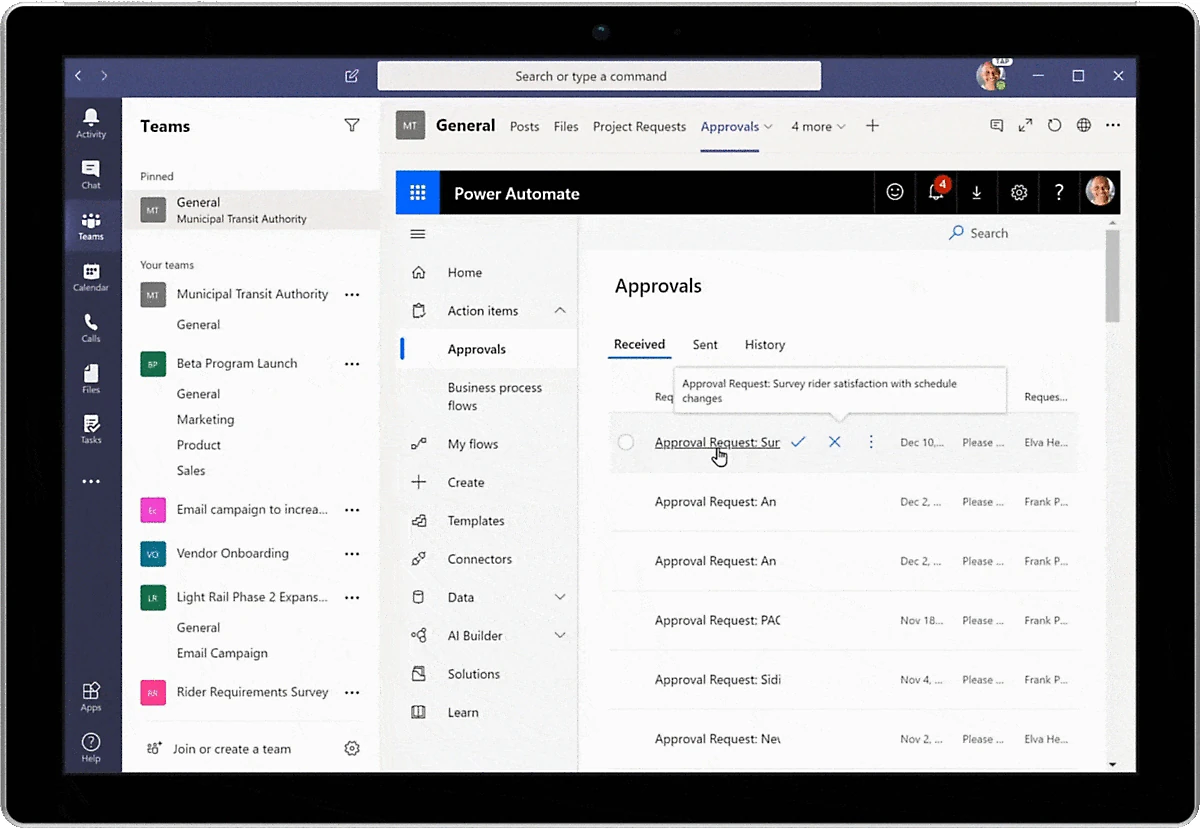
Key Features
Microsoft Project is a comprehensive project management software designed for enterprise-level project planning and execution. It offers a range of features including Gantt charts, task scheduling, resource management, and project timelines. The software integrates seamlessly with other Microsoft products like Office 365, making it a powerful tool for organizations already using the Microsoft ecosystem. Key features include project portfolio management, time tracking, and robust reporting tools.
Pros and Cons
Pros:
- Powerful and feature-rich
- Seamless integration with Microsoft Office suite
- Strong project planning and scheduling capabilities
- Excellent for large and complex projects
- Advanced resource management features
Cons:
- Steep learning curve for new users
- Can be expensive for small teams
- Overkill for simple projects
Pricing
Microsoft Project offers several pricing options:
- Project Plan 1: $10 per user per month, with basic project management features.
- Project Plan 3: $30 per user per month, including advanced project planning, scheduling, and resource management.
- Project Plan 5: $55 per user per month, offering comprehensive project and portfolio management capabilities.
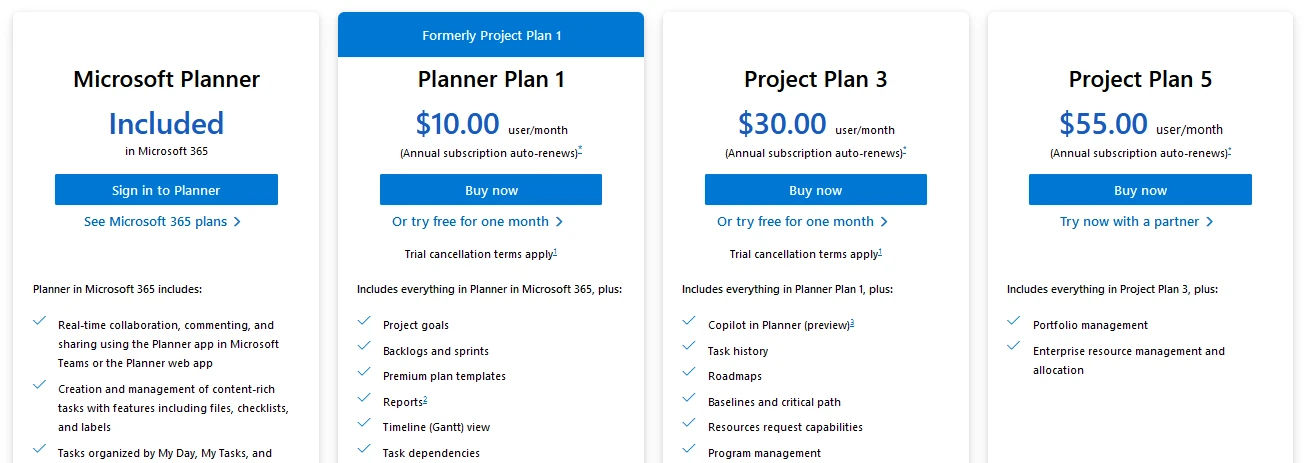
Website: www.microsoft.com
7. Zoha Projects
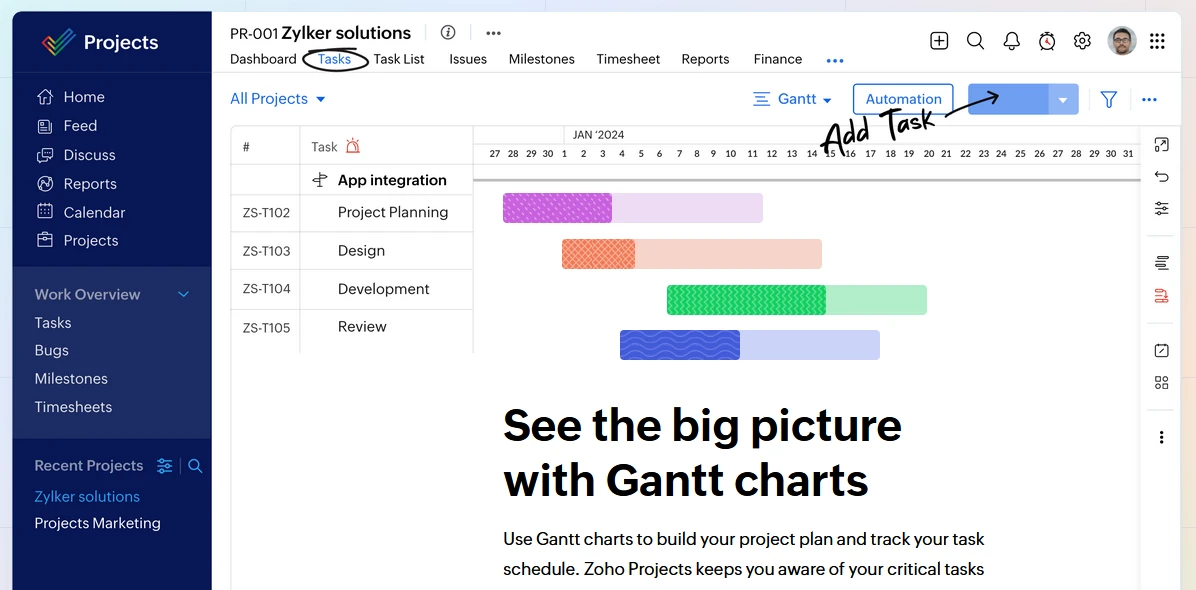
Key Features
Zoho Projects is a versatile project management tool known for its affordability and extensive feature set. It offers task management, time tracking, document management, and Gantt charts. Zoho Projects also includes features for collaboration, such as forums, chat, and integrations with other Zoho applications and third-party tools like Google Drive and Slack. The software is suitable for businesses of all sizes and industries.
Pros and Cons
Pros:
- Affordable pricing plans
- Comprehensive feature set
- Excellent integration with Zoho ecosystem and third-party apps
- User-friendly interface
- Strong collaboration tools
Cons:
- Some advanced features are limited to higher-tier plans
- Can be overwhelming for very small teams
- Occasional performance issues with large projects
Pricing
Zoho Projects offers various pricing plans:
- Free: For up to 3 users and 2 projects.
- Premium: $5 per user per month, with advanced features like Gantt charts, custom views, and automation.
- Enterprise: $10 per user per month, offering advanced customization, resource utilization charts, and more.
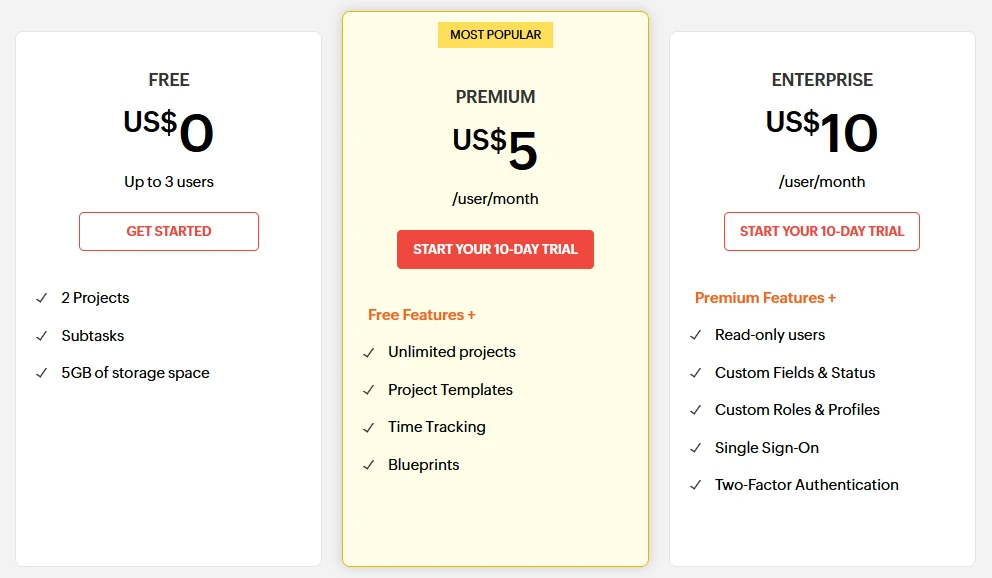
Website: zoho.com
8. Notion
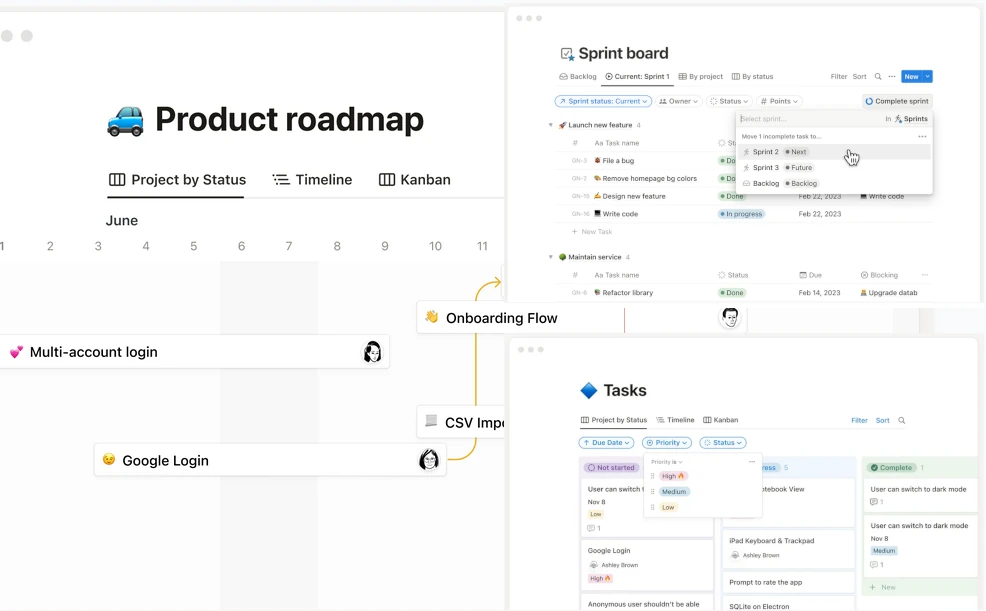
Key Features
Notion is an all-in-one workspace that combines project management, note-taking, and database features into a single platform. It offers a flexible and customizable interface where users can create pages, databases, calendars, and kanban boards. Notion’s key features include task management, document sharing, collaboration tools, and integration with other apps through APIs and third-party services. It’s ideal for teams looking for a highly adaptable tool.
Pros and Cons
Pros:
- Highly customizable and flexible
- Combines multiple functionalities in one platform
- User-friendly and visually appealing interface
- Strong community and template library
- Affordable pricing
Cons:
- Lacks some advanced project management features
- Can be overwhelming due to its flexibility
- Performance issues with very large databases
Pricing
Notion offers the following pricing plans:
- Personal: Free for individuals with basic features.
- Personal Pro: $4 per user per month, offering unlimited file uploads and advanced permissions.
- Team: $8 per user per month, with collaborative features and admin tools.
- Enterprise: Custom pricing with advanced security, control, and support.
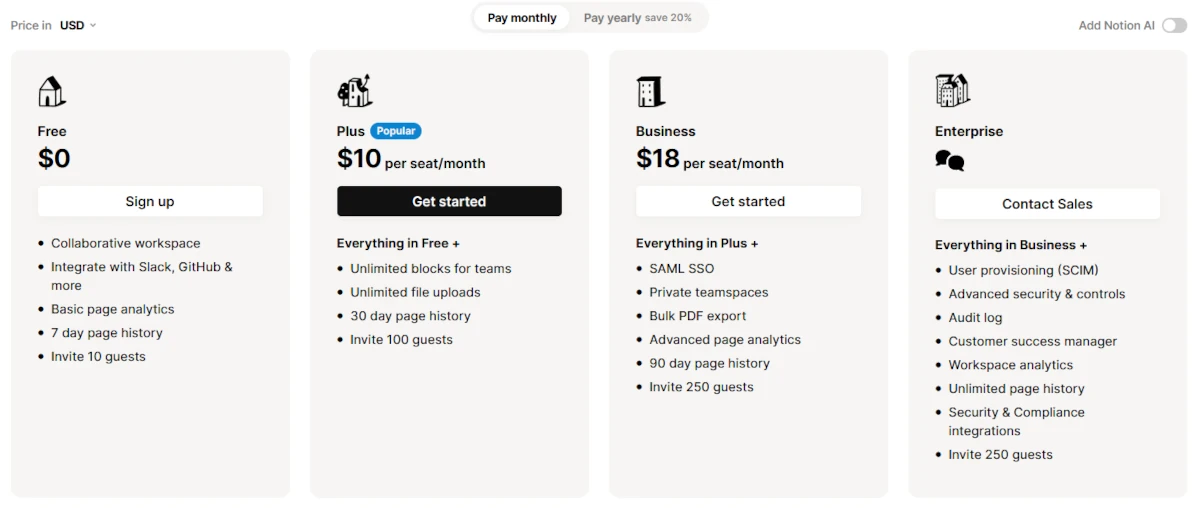
Website: notion.so
9. Wrike
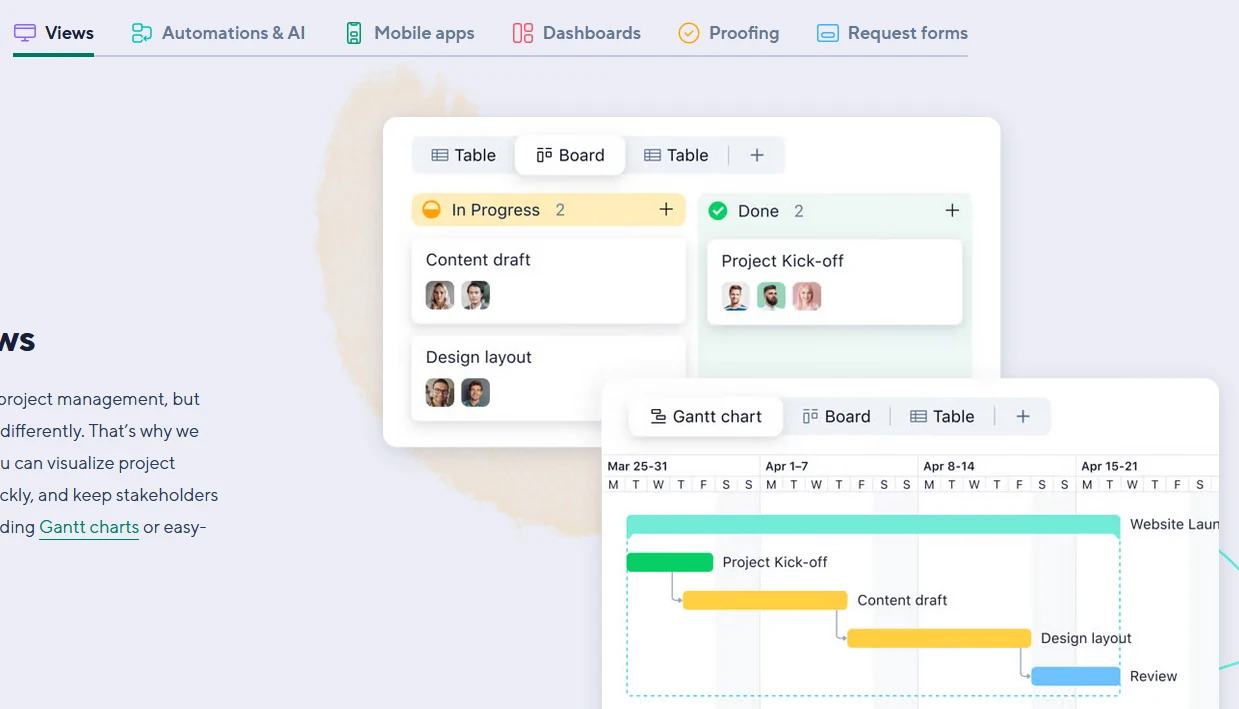
Key Features
Wrike is a powerful project management tool designed for teams that need flexibility and scalability. It offers a wide range of features, including task management, time tracking, Gantt charts, and real-time collaboration tools. Wrike also provides custom workflows, dashboards, and advanced reporting capabilities. It integrates with numerous third-party apps such as Slack, Salesforce, and Adobe Creative Cloud, making it suitable for various industries.
Pros and Cons
Pros:
- Highly customizable and scalable
- Strong collaboration features
- Extensive integration options
- Robust reporting and analytics tools
- User-friendly interface
Cons:
- Can be expensive for small teams
- Steeper learning curve for new users
- Advanced features require higher-tier plans
Pricing
Wrike offers several pricing plans:
- Free: For up to 5 users with basic features.
- Professional: $9.80 per user per month, including Gantt charts and advanced task management.
- Business: $24.80 per user per month, with custom workflows, dashboards, and advanced reporting.
- Enterprise: Custom pricing for large organizations with advanced security and support.
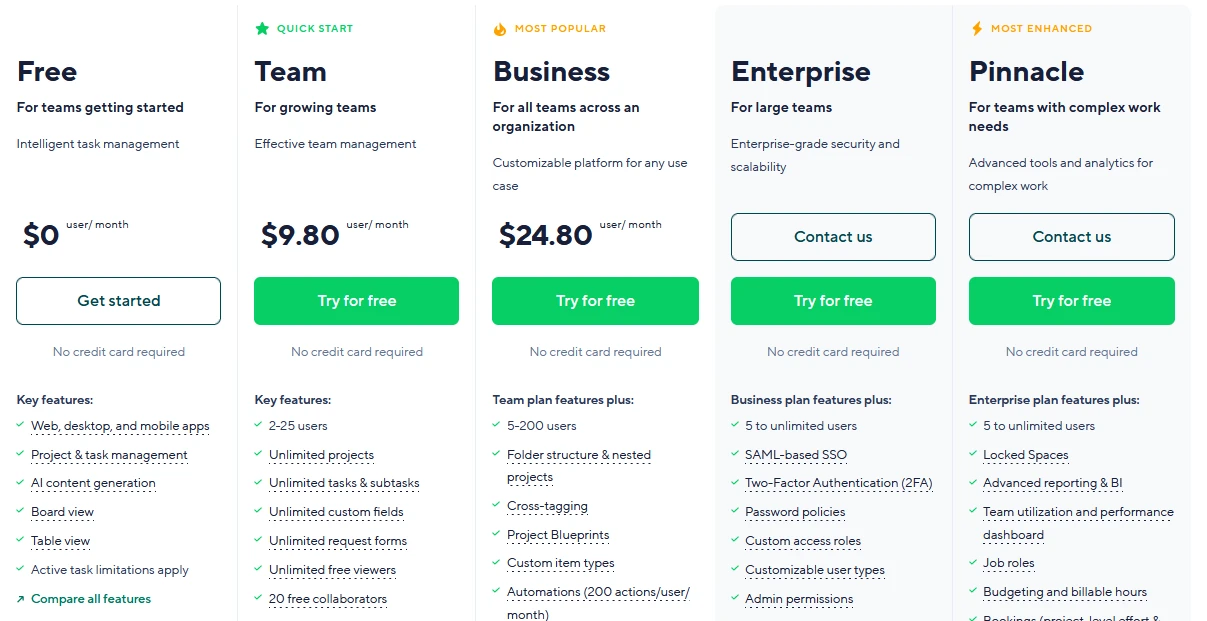
Website: wrike.com
10. Monday.com
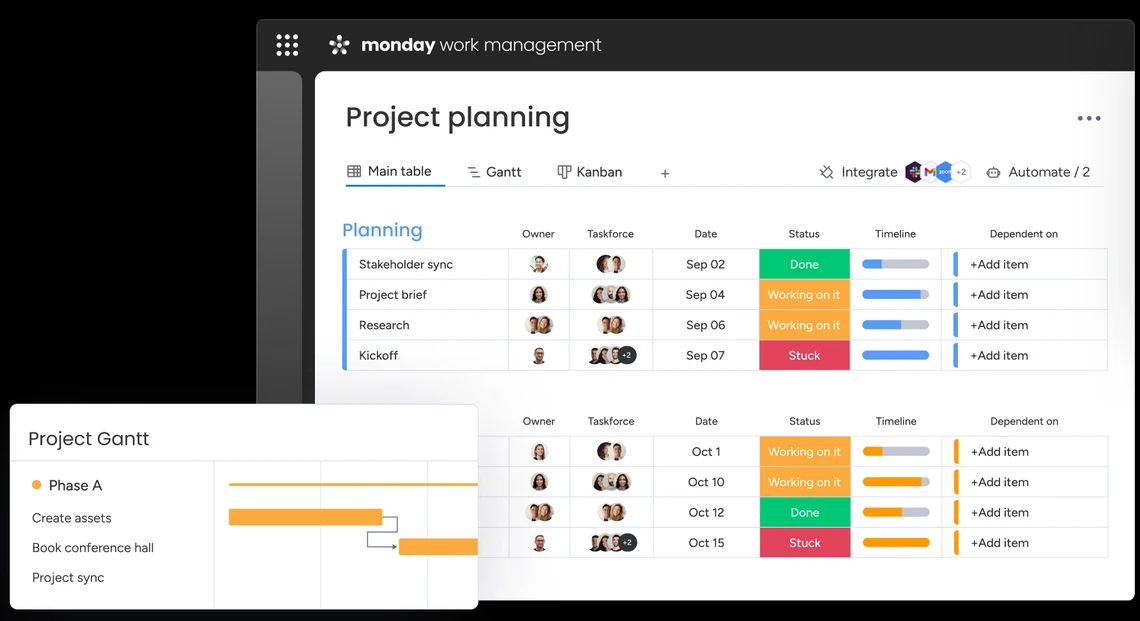
Key Features
Monday.com is a versatile project management platform known for its ease of use and visual appeal. It offers customizable workflows, task management, time tracking, and collaboration tools. Users can create boards to manage tasks and projects with various views such as kanban, Gantt charts, and timelines. Monday.com integrates with numerous apps like Slack, Google Drive, and Microsoft Teams, providing a cohesive work environment.
Pros and Cons
Pros:
- Intuitive and visually appealing interface
- Highly customizable workflows
- Wide range of integrations
- Excellent for team collaboration
- Strong customer support
Cons:
- Can become expensive with additional features and users
- Some advanced features can be complex to set up
- Limited offline access
Pricing
Monday.com offers multiple pricing tiers:
- Individual: Free for up to 2 users with basic features.
- Basic: $8 per user per month, including unlimited boards and docs.
- Standard: $10 per user per month, with timeline and Gantt views, calendar view, and guest access.
- Pro: $16 per user per month, offering time tracking, formula column, and private boards.
- Enterprise: Custom pricing for larger organizations with advanced security and enterprise-grade features.
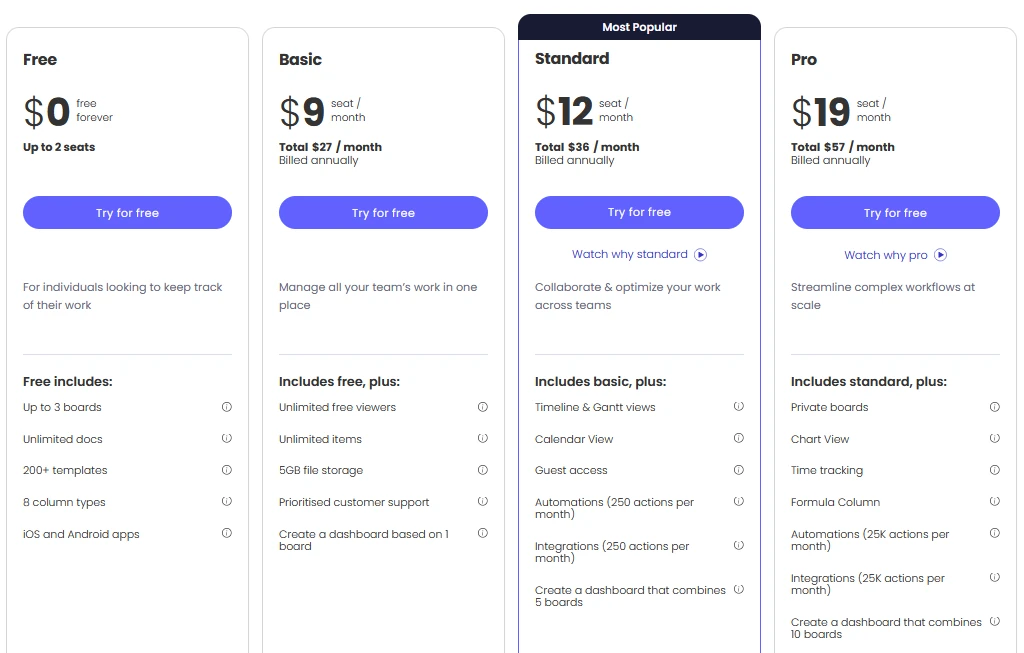
Website: wrike.com